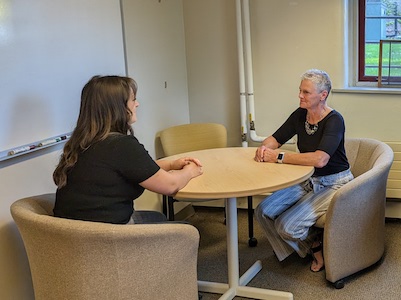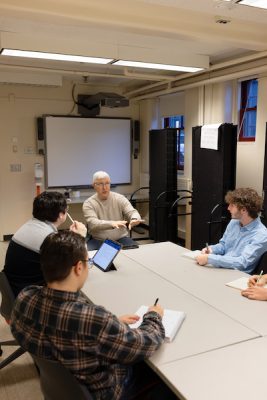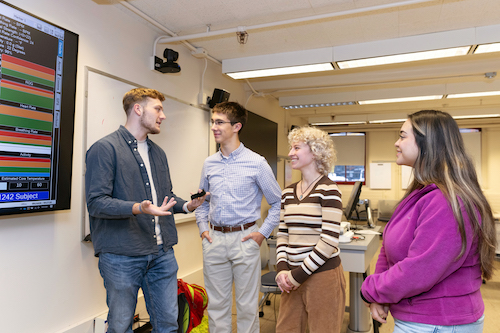Clinical Simulations
Clinical Simulations are recorded, live-actor interactions that approximate challenging situations in a professional setting, using trained actors to portray standardized individuals.
 The School of Education uses Clinical Simulation in many teacher preparation, educational leadership, and counseling programs. This dynamic, effective, and engaging training tool can also be used to prepare professionals from many other disciplines and industries to address common challenges.
The School of Education uses Clinical Simulation in many teacher preparation, educational leadership, and counseling programs. This dynamic, effective, and engaging training tool can also be used to prepare professionals from many other disciplines and industries to address common challenges.
Why “clinical”? The name is a nod to medical education—the simulations used in medical preparation inspired the use of simulations in educator preparation. “Clinical” also points to the use of data in each simulation: in preparation, gathered during, and derived.
“Our focus is not about how we believe we did or what we think we said, but on the data—what we actually said and did in the moment—and the implications of those practices on the student, and the broader school community. Our clinical focus is on the analysis of practice and data-informed decision making.”
Professor Ben Dotger
 As an adaptable, scalable, and highly effective experiential pedagogy, Clinical Simulations:
As an adaptable, scalable, and highly effective experiential pedagogy, Clinical Simulations:
- Offer safe, shared-learning environments that closely approximate authentic problems of practice.
- Immerse trainees in a low-risk setting, in which interactions can be observed and trainees can receive coaching and feedback.
- Provide opportunities to synthesize what is known into what can be done in high-stakes situations.
- Ensure—through standardized training—that trainees have comparable opportunities to practice key skills.
- Can be used to address issues of equity, community building, cultural responsiveness, and inclusivity.

The Immersive, Reflective SIMS Process
A typical step-by-step process for a Clinical Simulation:
- Introduction to the problem
- Live actor simulation session (1:1 with the “standardized individual”)
- Immediate debrief with cohort team (“Wow! What just happened?!”)
- Individual’s review of simulation data (“Oh, I really did say that!”)
- Whole-group debrief with teacher candidate data (“In minute three, you hear me say…”)
- Self-reflection

“Today in student teacher placement, I had my first ever round of parent/teacher conferences, and I just wanted to reach out and tell you how much clinical simulations helped prepare me! While I was not the primary teacher of the class, I still felt really comfortable speaking to all different types of parents, and I was prepared.”
Brad Schlapak ’24
Examples of Current SIMS
Teacher Education
- Academic & Behavioral Performance
- Emotional Health and Students in Crisis
- Challenged Curricula
- Physical and Verbal Abuse in the home
- Proactive Support of Students with Disabilities
- Physical assault on school grounds
- Divorce/Separated Parents or Guardians
- Plagiarism and Cheating
- Fostering inclusive classroom structures with colleagues
- Post-secondary Education options
- Another new kid in town…
- Verbally aggressive student
- Student auditions — “didn’t make the cut”
Content Area SIMs
- Counseling:
- Suicide ideation
- Tiered SIMs: physical assault and sexual orientation
- English/Language Arts:
- Engaging with colleague to support English Language Learners
- Student with Autism in ELA classroom
- Social Studies:
- Alignment of School Curriculum and Family Priorities
- Secondary Mathematics:
- Iconic misinterpretation
- Zeros and Negatives
- Algebraic equations
- Secondary Science:
- Student with Disability in Science or Health/PE environments
- Climate Change
- Graph interpretation
- “goodness of fit”
- Why do big ships float?
- Curriculum challenges
- Elementary Science:
- Niagara Falls
- Shore Erosion
- Crash!
- Shadows and Earth/Sun
- What’s in the water?
- Grand Prismatic Spring
- School Leader Education:
- It’s a bit early for a drink…
- Assault on School Grounds
- Reproductive Education
- Grade Disputes
- Substance Abuse
- Community Volunteers
- Plagiarism
- Instructional Decision-making
- Coach ‘em!
- Lunchline mishap
- The data show…
- All together now…
- Co-Teaching and Inclusive structures
- Restorative discipline
- Physical and verbal admonishment
- Facilities Use — one space for all
- “Those students”…
Partners & Collaborators
Principal Collaborators
Funding Sources
- Arthur Vining Davis Foundations
- Institute for Education Sciences
- National Science Foundation
- Spencer Foundation
- Syracuse University
- CUSE Grant Program
- Joan N. Burstyn Award for Collaborative Research
- Vice President for Research
Engagement Beyond SU
- MIT Teaching Systems Lab
- MOFET Institute (Israel)
- Technical University of Munich (Germany)
- University of Mannheim (Germany)
- Wake County Public School System
